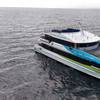Forward Ships Receives South Korean Patent
Forward Ships, which enables the adoption of liquefied natural gas (LNG) as the fuel of choice for ships at a global scale, said that its innovative machinery arrangement received its first official patent right from South Korea, a major shipbuilding nation.
The Korean Intellectual Property Office Examiner decided to grant this patent application pursuant to Article 66 of the Korean Patent Act to Arista Shipping S. A.
The Project Forward initiative led by Athens-Based Arista Shipping, demonstrates that with LNG as fuel, an advanced hull design, and highly efficient propulsion machinery, it will be possible to meet the IMO’s target for a 40 percent reduction in carbon intensity by 2030.
The patent-pending machinery arrangement consists of only two low-pressure, four-stroke Wärtsilä 31Dual Fuel main engines and two PTO/PTIs, coupled on one shaft that drives a CPP propeller.
This arrangement doubles the propulsion redundancy, quadruples the power-generating redundancy, and provides safe return to port, setting a new standard and lowering operating expenses.
This arrangement allows for an improvement in the streamlining of the aft part, the percentage of which is not taken into account in the consumption tables. Further, the positioning of the engines above gearbox centreline allows for additional hull lines’ optimization.
Model tests of the Project’s concept vessel indicate that the Energy Efficiency Design Index (EEDI) is well below the currently most stringent Phase III level. The EEDI reflects the CO2 emissions per transport work and is a measure of carbon intensity. EEDI Phase III is applicable to ships built after 2025 and signifies a 30 percent reduction from the 2008 reference level.
The IMO has also announced that efforts should be made for a possible further reduction in CO2 emissions per transport work of up to 70 percent by 2050. One commonly discussed way to reduce such emissions has been to limit the propulsion engine power, but this would require a significantly lower service speed, resulting in a serious impact on the chain of logistics.
Project Forward shows that this 70 percent reduction in CO2 emissions target can be met, even without lowering service speeds, through the use of carbon neutral fuels mixed with LNG. Such carbon neutral fuels can be transported, stored, and consumed in a similar way to that of fossil LNG.
“Through the advanced engine technology available today, LNG has a clearly superior well-to-wake emissions profile compared to liquid fuel. LNG appears not as a transition fuel, but the fuel of tomorrow and for many years to come,” says Antonis Trakakis, Technical Director at Arista and Chief Technology Officer of Forward Ships.













